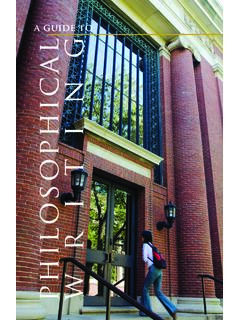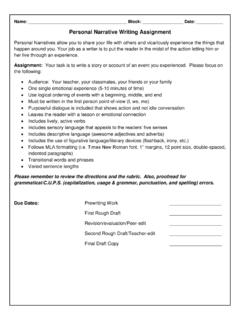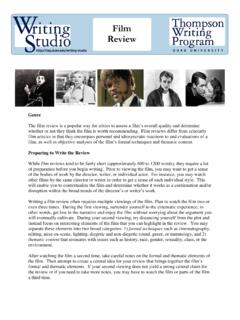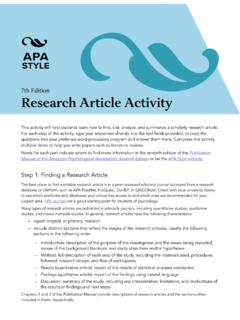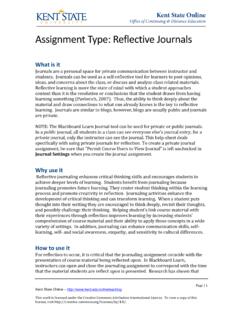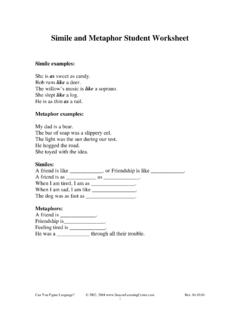Transcription of A Brief Guide to Writing the Philosophy Paper
1 HARVARD COLLEGE Writing CenterHarvard College Writing ProgramFaculty of Arts and SciencesHarvard UniversityWRITING CENTER Brief Guide SERIESA Brief Guide to Writing the Philosophy PaperThe Challenges of Philosophical WritingThe aim of the assignments in your Philosophy classes is to get you doing Philosophy . But what is Philosophy , and how is it to be done? The answer is complicated. Philosophers are often motivated by one or more of what we might call the Big Questions, such as: How should we live? Is there free will? How do we know anything? or, What is truth? While philosophers do not agree among themselves on either the range of proper philosophical questions or the proper methods of answering them, they do agree that merely expressing one s personal opinions on controversial topics like these is not doing Philosophy .
2 Rather, philosophers insist on the method of first attaining clarity about the exact question being asked, and then providing answers supported by clear, logically structured ideal philosophical argument should lead the reader in undeniable logical steps from obviously true premises to an unobvious conclusion. A negative argument is an objection that tries to show that a claim, theory, or argument is mistaken; if it does so successfully, we say that it refutes it. A positive argument tries to support a claim or theory, for example, the view that there is genuine free will, or the view that we should never eat animals. Positive philosophical arguments about the Big Questions that are ideal are extremely hard to construct, and philosophers interested in formulating or criticizing such arguments usually end up discussing other questions that may at first seem pedantic or contrived.
3 These questions motivate philosophers because they seem, after investigation, to be logically related to the Big Questions and to shed light on them. So, for example, while trying to answer Big Questions like those above, philosophers might find themselves discussing questions like (respectively): When would it be morally permissible to push someone into the path of a speeding trolley? What is a cause? Do I know that I have hands? Is there an external world? While arguing about these questions may appear silly or pointless, the satisfactions of Philosophy are often derived from, first, discovering and explicating how they are logically connected to the Big Questions, and second, constructing and defending philosophical arguments to answer them in turn.
4 Good Philosophy proceeds with modest, careful and clear a Philosophy PaperPhilosophy assignments generally ask you to consider some thesis or argument, often a thesis or argument that has been presented by another philosopher (a thesis is a claim that may be true or false). Given this thesis or argument, you may be asked to do one or more of the following: explain it, offer an argument in support of it, offer an objection to it, defend against an objection to it, evaluate the arguments for and against it, discuss what consequences it might have, determine whether some other thesis or argument commits one to it ( , if I accepted the other thesis or argument, would I be rationally required to accept this one because I accept the other one?)
5 , or determine whether some other view can be held consistently with it. No matter which of these tasks you are asked to complete, your Paper should normally meet the following structural requirements:2s Begin by formulating your precise thesis. State your thesis clearly and concisely in your introduction so that your reader understands what your Paper sets out to achieve. Get to the point quickly and without digression. Don t try to introduce your argument within a grand historical narrative , for example. Your thesis does not have to be the same as any thesis mentioned in the assignment , although in some cases it may Writing EXAMPLEJen was an excellent Philosophy writer who received the following assignment :Evaluate Smith s argument for the claim that people lack free decided before she began Writing her Paper that Smith s argument ultimately fails because it trades on an ambiguity.
6 Accordingly, she began her Paper with the following sentence:In this Paper , I will refute Smith s argument against the existence of free will by showing that it trades on an s thesis, then, was that Smith s argument is invalid because it trades on an ambiguity and she stated it clearly right at the beginning of her Paper . Note that Jen need not say anything at all about the truth or falsity of the thesis that people lack free will; even if Smith s argument for it is invalid, it might still be true that people lack free Define technical or ambiguous terms used in your thesis or your argument. You will need to define for your reader any special or unclear terms that appear in your thesis, or in the discussion at hand.
7 Write so that you could be clearly understood by a student who has taken some classes in Philosophy but not this particular class. (Think of this imaginary reader whenever you need to decide how much you need to say to set up a discussion, or to judge the overall clarity of your work.)s If necessary, motivate your thesis ( explain to your reader why they should care about it). You ll need to do this, especially in longer assignments, when it isn t clear why a reader would care about the truth of the claim you are arguing Explain briefly how you will argue in favor of your thesis. In the example above, Jen s thesis itself is stated in such a way as to indicate how the argument for it will proceed.
8 Jen might reasonably have chosen to enlarge a little on this explanation, for example by indicating in her introduction which term in Smith s argument is ambiguous, or by indicating why she thinks others may have overlooked the ambiguity. s If necessary, explain the argument you will be critiquing. If your assignment asks you to critique someone else s argument (as in the example above), you will need to explain that argument before presenting your critique of it. Sometimes, the entire task of an assignment will be simply to explain an argument originated by somebody else, rather than to provide an argument for your own thesis. While you will not always be expected to provide your own completely original arguments or theories in Philosophy papers, you must always practice Philosophy .
9 This means that you should explain the argument in your own words and according to your own understanding of the steps involved in it. You will need to be very clear on the precise logical structure of an author s argument ( this may not be clearly represented by the order in which the argument is written down in the readings). Don t try to impress your reader with your wide knowledge by summarizing everything in a particular article, or everything you have learned about the topic: stick to explaining only the details that are essential to the author s argument for the particular thesis and to your own argument for your thesis. Also take care to clearly indicate when you are speaking in your own voice, and when you are explicating someone else s argument or point of view but not yourself advocating care to clearly indicate when you are speaking in your own voice, and when you are explicating someone else s argument or point of view but not yourself advocating Writing EXAMPLEIn answer to the previously mentioned assignment , George wrote a Paper arguing that there was free will, on the grounds that George was himself aware of making all kinds of free choices every day.
10 His conclusion was that Smith s argument (which he had not explained, and mentioned only at the end of the Paper ) must be false, since there is free s professor asked him to rewrite, telling him that he had failed to engage with Smith s argument in the first draft. Here is an excerpt from George s less-than-successful Smith says on , The truth of causal determinism having been established by this argument from elimination, we shall move on to prove incompatibilism. Smith then says that the source of an agent s actions is some event that occurred before he was even born. If an event occurred before someone was born, it cannot be a product of his choices. Therefore incompatibilism is true.

